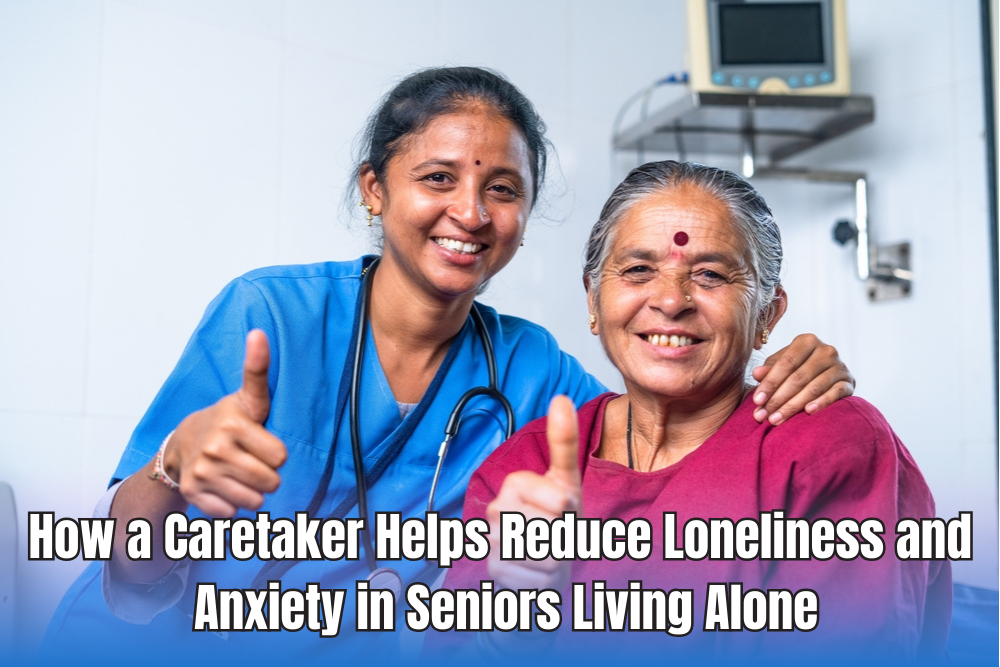As seniors age, many find themselves living alone, which can often lead to feelings of loneliness, isolation, and anxiety. The emotional toll of living alone can affect their mental health, leading to depression and stress. A trained caretaker can provide much-needed support by not only assisting with physical care but also offering emotional companionship and reassurance. This article explores how a professional caretaker can reduce loneliness and anxiety in seniors living alone and improve their overall quality of life.
Why Loneliness and Anxiety Are Common in Seniors
There are several reasons why seniors may feel lonely or anxious when living alone, including:
- Loss of Spouse or Loved Ones: The death of a spouse or close family member often leads to emotional voids that can be difficult to fill.
- Reduced Social Interaction: With age, it becomes harder to maintain social connections due to physical limitations, such as mobility issues or hearing loss.
- Health Conditions: Chronic conditions like arthritis, diabetes, or dementia may reduce a senior’s ability to engage in social or physical activities, increasing their sense of isolation.
- Fear of Falling or Medical Emergencies: Seniors living alone often fear accidents or health emergencies, which increases anxiety.
Caretakers can provide the support, companionship, and structure needed to reduce these feelings, improving the emotional well-being of elderly individuals living alone.
How a Caretaker Helps Reduce Loneliness and Anxiety
1. Providing Companionship
One of the most important roles a caretaker plays is offering companionship. Whether it’s through simple conversations, watching TV together, or sharing meals, a caretaker ensures the senior feels connected and valued. This can significantly reduce feelings of loneliness and isolation.
2. Encouraging Social Interactions
Caretakers encourage seniors to stay in touch with family and friends by helping them make phone calls, set up video chats, or arrange social visits. They can also assist with attending social gatherings or community activities that seniors might otherwise avoid due to mobility issues or anxiety.
3. Assisting with Daily Tasks and Reducing Stress
Daily tasks such as cooking, cleaning, and bathing can become overwhelming for seniors. A caretaker helps with these chores, reducing the physical and mental burden on the senior. This allows them to feel more in control of their surroundings, which alleviates anxiety.
4. Providing Mental and Emotional Support
Seniors often worry about their health or the future. A caretaker offers emotional support by listening to their concerns and providing reassurance. They can also help with coping strategies for managing anxiety, such as practicing relaxation techniques or mindfulness.
5. Engaging in Hobbies and Activities
A caretaker encourages seniors to engage in hobbies they enjoy, whether it’s reading, knitting, gardening, or even light physical exercises. These activities not only keep the senior mentally engaged but also provide a sense of purpose and achievement.
6. Assisting with Physical Activity
Staying active is essential for both physical and mental health. A caretaker encourages safe and appropriate physical activity—such as daily walks or stretching exercises—to keep the senior physically healthy and improve mood through the release of endorphins.
7. Providing Consistent Monitoring
Caretakers monitor the health of elderly individuals, ensuring they take medications on time, helping with doctor appointments, and ensuring they get adequate rest. Having someone consistently available to manage their physical and emotional needs provides reassurance and reduces anxiety about health emergencies.
Why Hiring a Professional Caretaker Is Beneficial for Family Members
Family members often feel guilt or anxiety about not being able to provide the constant support their elderly loved ones need. Hiring a professional caretaker allows family members to be assured that their loved one is receiving the care, companionship, and attention they need. This provides peace of mind, knowing that a trained individual is looking after their loved one, so they can focus on their own responsibilities without worrying about their parent’s well-being.
FAQs About Caretakers Reducing Loneliness and Anxiety
- How does a caretaker reduce loneliness in elderly people?
A caretaker provides regular companionship, engages in conversations, and encourages social interaction, helping seniors feel connected and valued. - Can a caretaker help manage anxiety in seniors?
Yes, caretakers offer emotional support, help seniors cope with anxiety through relaxation techniques, and provide a calm and reassuring presence. - How do caretakers help with daily tasks that increase stress?
Caretakers assist with tasks like cooking, cleaning, and personal hygiene, reducing the physical strain and stress for seniors. - What activities do caretakers engage in with seniors to reduce loneliness?
Caretakers encourage hobbies, physical activities, and social engagements, providing a sense of purpose and reducing feelings of isolation. - Is it safe for seniors to have a caretaker at home?
Yes, professional caretakers are trained to handle elderly care safely, ensuring a comfortable and secure environment.
Conclusion
Living alone can be tough for seniors, leading to loneliness, anxiety, and stress. A professional caretaker not only provides physical care but also offers emotional support, ensuring seniors feel less isolated and more secure. By helping with daily tasks, encouraging social interaction, and offering consistent companionship, a caretaker can significantly improve the mental and emotional well-being of elderly individuals living alone.
If you’re looking for reliable and compassionate care for your elderly loved one, visit Shree Swami Samarth Patients Seva (www.sssps.in). We provide experienced caretakers who help reduce loneliness and anxiety, offering peace of mind to both seniors and their families.


